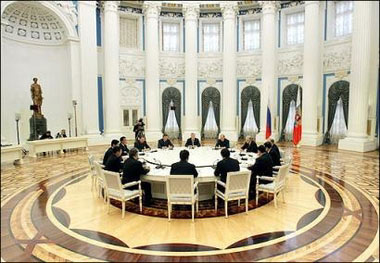The Shanghai Co-operation Organization (SCO) is not an oriental version of
the North Atlantic Treaty Organization (NATO) as some claim, and it has no plans
to become a military bloc, the organization chief said yesterday.

Chairmen of the Parliaments of
the Shanghai Cooperation Organization (SCO) Member States meet with
Russian President Vladimir Putin in Moscow's Kremlin. Russia and China
moved to fortify their growing security cooperation in Central Asia but
reassured the United States that their new-found unity of purpose in the
region was not designed to subvert US interests
there.[AFP] |
The allegation that the SCO is
an eastern equivalent to NATO is "totally groundless," said Zhang Deguang, the
SCO's secretary-general, at a news conference in Beijing ahead of the
organization's summit in Shanghai next week.
"The SCO has never sought confrontation with any parties and its aims have
nothing at all to do with becoming a military bloc," said Zhang.
The organization will continue holding high the banner of peace, co-operation
and openness, he added.
The SCO, established in Shanghai in 2001, is a regional co-operation and
security association comprising of China, Russia, Kazakhstan, Kyrgyzstan,
Tajikistan, and Uzbekistan. India, Mongolia, Iran, and Pakistan are observers to
the organization.
The leaders of the four observer countries have been invited to attend next
week's meeting, including Iranian President Mahmoud Ahmadinejad.
But Zhang said the Iranian nuclear problem will not be the main issue at the
SCO summit.
"Given the regional nature of the SCO, I do not think the Iranian problem
will be a priority," he told reporters.
He added that observer countries would not have voting rights at the summit.
"Their participation will be strictly in line with the agenda that is agreed
on by the SCO member countries."
The SCO pursues an open policy, but it has not formulated legal documents on
accepting new members at present, he said.
On the subject of co-operation in nuclear non-proliferation Zhang said: "A
mechanism to fight the proliferation of nuclear weapons and weapons of mass
destruction has been created in the framework of the SCO, but we do not yet have
legal documents on the issue."
The Shanghai summit marks the organization's fifth anniversary and Zhang said
it would produce some crucial decisions.
During the summit leaders of the member countries will review the SCO's
achievements and its construction and development over the past five years.
"A declaration on the fifth anniversary of the SCO will be signed at the
summit," said Zhang.
Important documents on the promotion of the partnership in security and
economy, particularly in the energy field, will also be signed.
Zhang described the past five years as "a sowing season," saying the next
five years will "harvest" the fruits of the SCO's work.
He said the SCO plans to become more pragmatic in strengthening co-operation
among member countries to promote economic growth.
"Our present goal is to realize the free flow of commodities, capital,
technologies and services in the region within 20 years," said Zhang.
He said the SCO will establish an entrepreneurs committee to provide a
platform for executives in the member countries to seek co-operative partners.
Meanwhile "we are on the way to reaching an agreement on cross-border road
transport to facilitate multilateral exchanges," said Zhang.
He also highlighted the challenges the SCO faces, including the "three
forces" of terrorism, separatism and extremism, as well as drug trafficking,
cross-border crime and illegal weapons trafficking.
(China Daily 06/07/2006 page2)